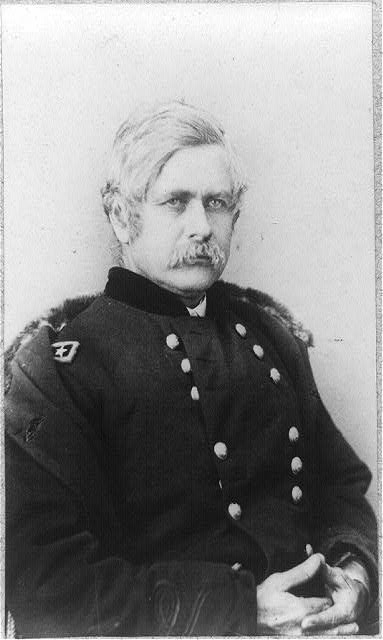Don’t Impede Edward Ord’s Columns

Edward O.C. Ord commanded the Army of the James at the end of the Civil War. In March 1865 they held the Union position north of the James River opposite the daunting Confederate works protecting Richmond. Before his final offensive against Petersburg, Richmond’s rail hub twenty miles to the south, Ulysses S. Grant instructed Ord to transfer four divisions, three infantry and one cavalry, south to replace Army of the Potomac troops manning the trenches southwest of the city.
Grant wanted Ord to move after dark on the 27th and be in position to replace the II Corps by early morning on the 29th. The Army of the James had thirty miles to march via Bermuda Hundred, crossing both the James and Appomattox along the way. Circumstances prevented their moving solely under cover of darkness.
Major General John Gibbon commanded the XXIV Corps who would send two divisions to Petersburg. Gibbon’s orders for the march, distributed on March 26, banned non-essential personnel from the column:
“No citizens, other than Government employees and officers’ servants, or wagons, carts, or other means of transportation, except such as belonging to the Government, will be allowed to accompany the command. The provost-marshal will place guards at all convenient points and prevent the passage of all unauthorized persons or means of transportation.”
He also called for a “strong guard” to march in the rear of each division “to take stringent measures to prevent straggling.”
Ord likewise hoped to prevent any interference with his march and had a creative solution to one potential cause for delay, published as his General Orders Number 34 the next day:
“In the movements of this army no wagons or vehicles of any description belonging to sutlers, traders, or camp-followers will be permitted to go along, and whenever such are found in the midst of or impeding the wagon trains or troops they will be at once turned out, and the goods contained will be confiscated or distributed to the troops.”
As I start tracking more Army of the James sources during the final campaign at Petersburg I will be on the lookout among the common soldiers’ letters, diaries, and recollections for any instances where they found themselves the happy recipients of a punished sutler.
Ultimately the standard for fast marching without delay paid dividends, Ord’s men performing well on the chase to Appomattox from April 3-9, 1865.
Excellent post.
I’ve always felt the pursuit of Lee to Appomattox Courthouse was one Grant’s finest campaigns, almost as brilliant as Vicksburg. Naysayers downplay Grant’s final victory by contending Lee’s army was a shadow of its former self by April 1865. But the bloody Overland Campaign of the previous year had sapped the morale and effectiveness of many of Grant’s troops, too.
Luckily, Grant still had enough aggressive commanders like Ord and Gibbon to get the job done.
General Ord has been special to me since I taught in Seaside, California for 24 years. Fort Ord closed in the early 1990’s. Ord was also with Sherman on the Monterey Peninsula in the post Mexican War years as well. He once tracked down several killers from San Miguel to Santa Barbara and had them executed. 1865 was not the first time he had to race toward a group of enemy and capture them.
General Ord is an unsung person of the war; he shows up again and again doing solid if insufficiently-heralded work that makes a decisive difference. I’m glad you’re casting your spotlight onto the Army of the James.
Ord’s chief of staff was Edward Serrell, the designer of the Swamp Angel. His grandson was Jonathan Wainwright, the man who surrendered Corregidor 75 years aog this coming May.
Although there is that nasty acoustic shadow at Iuka. I’ve always wondered why with the “sounds of silence” continuing at length Ord didn’t send out some sort of scout in Rosy’s direction.
True – but don’t forget – Grant was with Ord during that time – so it wasn’t just Ord who missed the opportunity to explore what was going on at Iuka. After that date, the relationship between Rosy & Grant was never the same. Ord was certainly a force throughout the war and was amazing in the final pursuit of Lee’s army.
What was the family line between EOC Ord and his younger brother Placidus? Placidus had some position on EOC’s staff, I think??!